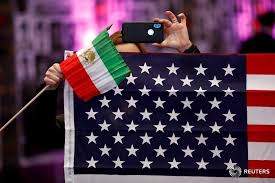U.S. faces tough U.N. battle if it pushes plan to extend Iran arms embargo

The United States faces a tough, messy battle if it uses a threat to trigger a return of all United Nations sanctions on Iran as leverage to get the 15-member Security Council to extend and strengthen an arms embargo on Tehran, diplomats said.
Washington has shared its strategy, confirmed by a U.S. official speaking on condition of anonymity, with Britain, France and Germany, who are council members and parties to the 2015 deal between Iran and world powers that prevents Tehran from developing nuclear weapons in exchange for sanctions relief.
Under that deal, a U.N. arms embargo on Iran is due to expire in October. A U.S.-drafted resolution to extend the embargo has been given to Britain, France and Germany, the U.S. official confirmed, but U.N. diplomats said it has not been shared with the remaining 11 council members, including Russia and China.
“It will be dead on arrival,” predicted a Security Council diplomat, speaking on condition of anonymity.
A resolution needs nine votes in favor and no vetoes by Russia, China, the United States, Britain or France to be adopted. Diplomats said the United States would likely struggle to get Russia and China to allow an arms embargo extension.
The Russian and Chinese missions to the United Nations did not immediately respond to a request for comment. Russia and China are also parties to the Iran nuclear deal.
If the council does not extend the arms embargo, the next step in the U.S. plan would be to try and trigger a so-called snapback of all U.N. sanctions on Iran, including the arms embargo, using a process outlined in the nuclear deal.
U.S. President Donald Trump quit the agreement in 2018 and described the accord from Barack Obama’s presidency as “the worst deal ever.”
“It’s very difficult to present yourself as a compliance watcher of a resolution you decided to pull out of,” said a European diplomat, speaking on condition of anonymity. “Either you’re in or either you’re out.”
However, a State Department legal argument, seen by Reuters late last year, made the case that Washington could still spark a sanctions snapback because it is named as a deal participant in a 2015 U.N. resolution that enshrines the nuclear agreement.
Some U.N. diplomats said that while legal opinions on whether the United States could do this were split, ultimately it would be up to council members to decide whether to accept a U.S. complaint of “significant non-performance” by Iran.
It is a move likely to be challenged, diplomats said.
“It’s going to be messy from a Security Council standpoint because, regardless of what (Britain, Germany and France) think, Russia and China are not going to sign up to that legal interpretation,” said a European official, speaking on condition of anonymity.
Iranian Foreign Minister Mohammad Javad Zarif dismissed the U.S. plan in a tweet on Monday, telling Washington to “stop dreaming.”
Photo: FILE PHOTO: Attendees hold flags from Iran and the United States as Iranian Americans from across California converge in Los Angeles to participate in the California Convention for a Free Iran and to express support for nationwide protests in Iran from Los Angeles, California, U.S., January 11, 2020. REUTERS/ Patrick T. Fallon/File Photo











